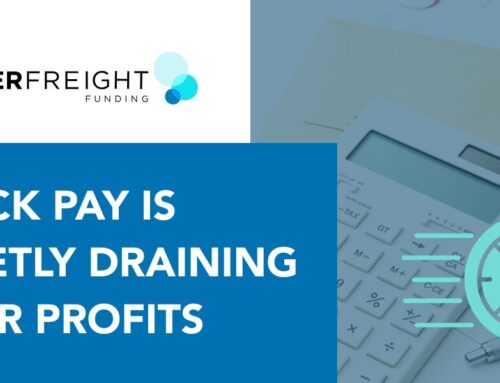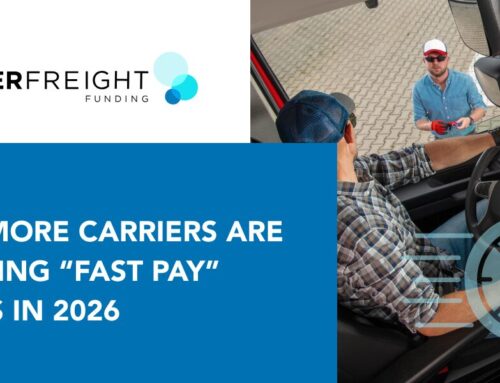Anyone in the trucking industry understands there are significant regulations for commercial transportation, whether the trip takes them around the block or across the country. While some guidelines are universal, others are related to how and where you transport goods. These selective rules are primarily related to whether your services involve:
Jump To Section
- Intrastate trucking: Intrastate trucking is more confined than interstate trucking. For your travels to qualify as intrastate, your entire trip stays within the same state’s borders.
- Interstate trucking: When you travel between state and country borders for your work, you’re participating in interstate trucking. Sometimes, even deliveries that take place in the same state as their place of origin can qualify as interstate trucking, depending on how you travel to your destination. Any time you cross a border, even if it’s to use a back road or highway en route, it’s considered interstate.
At Porter Freight Funding, our goal is to help you secure the best services for your transportation needs, whether you’re hauling across state lines or not. It’s helpful if both parties understand the difference between interstate and intrastate transportation and which type of trucking you’re in need of.
Types of Trucks Used in Interstate vs. Intrastate Trucking
For the most part, any truck can complete interstate and intrastate deliveries so long as they’re licensed properly. When you apply for a commercial driver’s license (CDL), you’ll need to signify what kind of transportation you’ll do. Changing your designation from intrastate to interstate or vice versa is as simple as resubmitting the form.
In general, certain truck types are better suited for longer or shorter distances and thus fit into one group more than the other. Take a look at which trucks are most common for both types of trucking and why.
Common Intrastate Trucks
You likely encounter all these vehicles on the road. Regardless of what kind of vehicle you typically use, understanding the basics of what each truck carries can help you optimize your services and learn more about the industry. Most trucks traveling within your state are:
- Box trucks: Box trucks can transport anything non-perishable, so they see a lot of consumer goods like electronics and online orders.
- Bucket trucks: Bucket trucks can help get work done anywhere. They feature a “bucket” lift people can use to complete construction or cleaning work.
- Dump trucks: Another truck often related to construction is dump trucks, which are capable of handling heavy materials like asphalt and gravel.
- Garbage trucks: However far you need to transport garbage, a garbage truck will compact it and make it simpler to move.
- Mixing trucks: Mixing trucks keep materials like concrete from solidifying before use by constantly rotating and agitating its contents.
- Tow trucks: Tow trucks will take broken down cars and other heavy equipment wherever they need to go for repairs, service and related projects.
Common Interstate Truck Types
On these truck types, you’re even more likely to see out-of-state license plates when they pass you on the highway:
- 18-wheelers: Depending on where you live, you might know these trucks as semis or tractor-trailers. They are good all-around transporters to take materials short and long distances.
- Flatbed trucks: Flatbed trucks are usually the first choice for wide loads. Their open-space design lets you strap on anything from lumber and vehicles to small sheds or buildings.
- Reefer trucks: Reefer units help trucks keep the stock they’re transporting at the ideal temperature. They most commonly move perishable foods, medicines and other things that need to keep a consistent temperature.
- Tanker trucks: Tanker trucks securely transport gasoline, chemicals, milk and other controlled liquids.

Insurance Requirements
A major difference between interstate and intrastate trucking guidelines is the insurance needs. For intrastate trucking, guidelines vary from state to state, so you must ensure you know whatever guidelines your home state has.
With interstate trucking, the regulations are a bit more stringent. Along with following the guidelines set forth by the states your route starts, ends and travels through, federal guidelines require a certain level of coverage depending on the size of the trucks you use and the freight you carry:
- Non-hazardous freight in trucks less than 10,001 pounds: $300,000
- Non-hazardous freight in trucks more than 10,001 pounds: $750,000
- Hazardous materials: $5 million
- Oil carriers: $1 million
Operating Authority Requirements
Operating authority is like a business license — you need one to run your trucking operations. Like insurance, you only need state authority for intrastate trucking, and not all states require even that. When you use interstate trucking, however, you’ll need to get authority from the federal Department of Transportation unless you’re operating exclusively within federally-designated commercial zones.
Unified Carrier Registration
Interstate truckers also need to consider UCR fees when hauling across state lines. The Unified Carrier Registration (UCR) is an act requiring interstate truckers to pay certain fees toward highway-related programs every year. The annual fee is based on the trucker’s fleet size, so smaller organizations will pay much less than large corporations.
IFTA Compliance
Finally, interstate truckers also need to stay up to date on their International Fuel Tax Agreement (IFTA) paperwork and payments. The IFTA allows the government to get your fuel taxes without making you file them in each state you travel through. While intrastate drivers do not have to think about this tax for the most part, certain states, like Pennsylvania and Maine, do require a separate fuel permit. Be sure to check your local guidelines regardless of the type of trucking you do.
Learn More and Grow With Porter
Interstate vs. intrastate trucking — whichever side your business is on, Porter Freight Funding will be by your side to serve your transportation needs. Our client-centered approach has helped teams around the U.S. find solutions to insurance, compliance, fuel cards, equipment financing and more. If you need it to get your trucking system in order, we’ll work tirelessly to help you get it.
If you’re ready to get more than 100 years of experience in freight bill factoring, contact our team today. We’ll be the support you need to grow and succeed in all your trucking endeavors.




